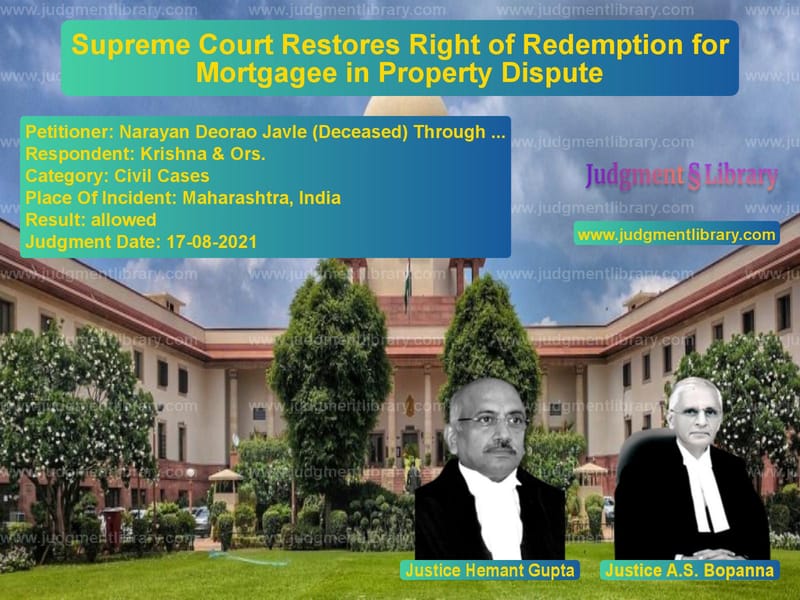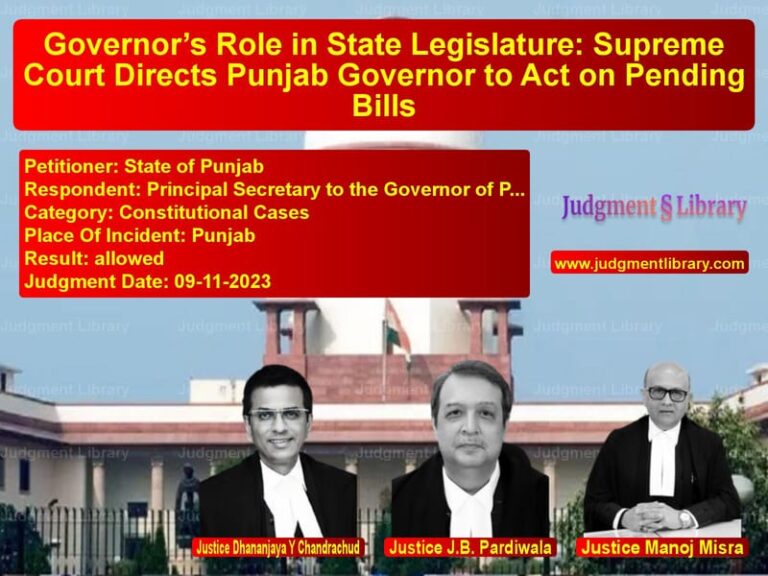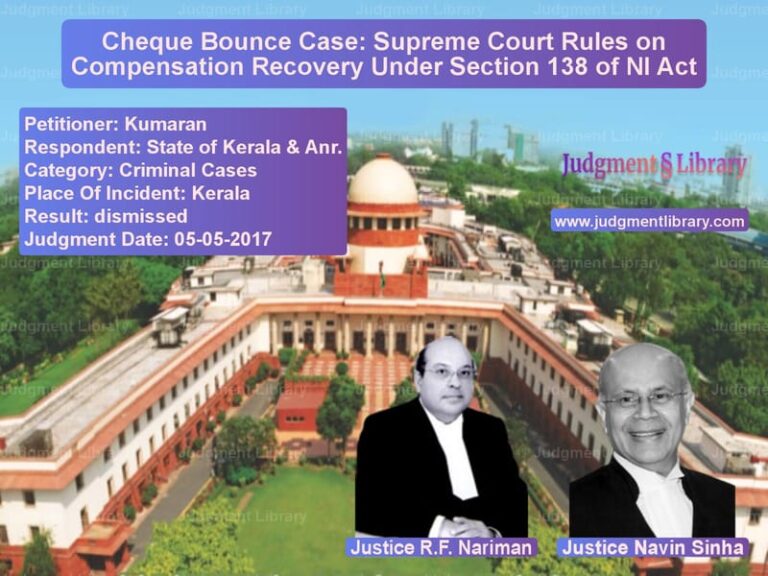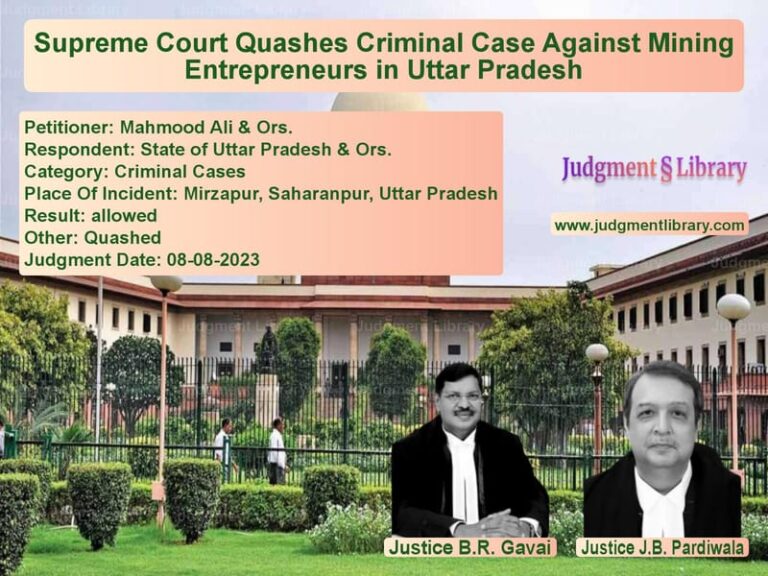Supreme Court Restores Right of Redemption for Mortgagee in Property Dispute
The case of Narayan Deorao Javle (Deceased) Through LRs vs. Krishna & Ors. deals with an important legal issue regarding the right of redemption under the Transfer of Property Act, 1882. The Supreme Court had to determine whether a mortgagor’s right to redeem property could be extinguished if the mortgagor was not made a party to a foreclosure suit filed by the mortgagee.
The dispute stemmed from a property transaction where the appellant (original plaintiff) purchased part of a mortgaged property before the mortgagee filed a foreclosure suit. The mortgagee proceeded to obtain a foreclosure decree without impleading the appellant, resulting in possession being taken from him. The Supreme Court was asked to decide whether the appellant’s right to redeem was legally extinguished.
Background of the Case
The case arose from the following facts:
- The original owners, defendant nos. 1 and 2, mortgaged the land to defendant no. 3 on April 30, 1954, for a sum of Rs. 700.
- Subsequently, they sold a part of the mortgaged land to the appellant on May 18, 1964, for Rs. 1,000, making the appellant the legal successor to the mortgagor.
- Despite this sale, defendant no. 3 (the mortgagee) filed a foreclosure suit in 1965 without impleading the appellant.
- The foreclosure decree was made final on June 4, 1969, and in execution of the decree, the mortgagee took possession from the appellant on December 5, 1980.
- The appellant then filed a redemption suit on January 23, 1984, before the expiration of the 30-year statutory period for redemption.
Petitioner’s Arguments
The appellant (Narayan Deorao Javle, now represented through legal representatives) contended that:
- He had purchased the land before the foreclosure suit was filed and was a necessary party to the proceedings.
- Since he was not impleaded in the foreclosure suit, the decree obtained was void and non-est in law.
- The right to redemption is a statutory right under Section 60 of the Transfer of Property Act, 1882 and could not be extinguished unless he was made a party to the foreclosure proceedings.
- The possession taken from him based on an invalid decree should be restored.
Respondent’s Arguments
The respondents (mortgagee and original mortgagors) countered by arguing:
- The original mortgagors had the right to redeem but failed to do so, leading to a foreclosure decree, which was legally valid.
- The appellant, as a subsequent purchaser, had no better rights than his predecessors.
- The mortgagee had no knowledge of the sale to the appellant, and therefore, he was not deliberately omitted from the foreclosure suit.
- The foreclosure decree had attained finality and should not be disturbed.
Key Legal Issues
The Supreme Court considered the following issues:
- Was the appellant a necessary party in the foreclosure suit?
- Did the foreclosure decree extinguish the appellant’s right to redemption?
- Could the appellant still exercise his statutory right of redemption under Section 60 of the Transfer of Property Act?
- What was the legal effect of the possession obtained by the mortgagee from the appellant?
Court’s Observations
The Supreme Court made several critical observations:
1. Right of Redemption is a Statutory Right
The Court reaffirmed that the right of redemption is a statutory right that cannot be extinguished by procedural irregularities. It stated:
“The right of redemption recognized under the Transfer of Property Act is a statutory and legal right that cannot be extinguished by any agreement made at the time of mortgage.”
2. Foreclosure Decree Without Necessary Party is Void
The Court emphasized that the foreclosure decree obtained without impleading the appellant was not binding on him. It held:
“A decree passed at the back of a necessary party is not binding and cannot extinguish statutory rights.”
3. Constructive Notice of Sale
The Court rejected the mortgagee’s argument that he was unaware of the appellant’s purchase, holding that:
“Where the parties reside in the same village and possession changes hands, constructive notice of the sale is presumed.”
4. Equity of Redemption Cannot Be Defeated by Collusion
The Court found that the foreclosure suit was likely a collusive action between the mortgagor and mortgagee to defeat the appellant’s right.
5. Possession Must Be Restored
The Court held that since possession was taken from the appellant under an invalid decree, it should be restored once he pays the mortgage amount.
Final Verdict
The Supreme Court allowed the appeal and ruled:
- The foreclosure decree obtained without impleading the appellant is set aside.
- The appellant retains his right to redeem the mortgaged property.
- The appellant is given three months to deposit the mortgage amount.
- Upon payment, possession shall be restored to the appellant.
The Court concluded:
“A mortgagee must implead all persons with an interest in the mortgaged property in foreclosure proceedings. Failure to do so renders the decree inoperative against those parties.”
Implications of the Judgment
This ruling has significant implications for property law:
- Protection of Right to Redemption: Mortgagors and their successors are protected from foreclosure suits conducted behind their backs.
- Importance of Impleading Necessary Parties: Mortgagees must ensure that all parties with an interest in the property are made parties in legal proceedings.
- Constructive Notice Recognized: The judgment acknowledges that constructive notice of a sale is enough to hold mortgagees accountable.
- Stronger Safeguards for Purchasers: Buyers of mortgaged property before foreclosure retain their right to redeem the mortgage.
Overall, this judgment reaffirms the supremacy of statutory rights over procedural technicalities and ensures fairness in property transactions.
Petitioner Name: Narayan Deorao Javle (Deceased) Through LRs.Respondent Name: Krishna & Ors..Judgment By: Justice Hemant Gupta, Justice A.S. Bopanna.Place Of Incident: Maharashtra, India.Judgment Date: 17-08-2021.
Don’t miss out on the full details! Download the complete judgment in PDF format below and gain valuable insights instantly!
Download Judgment: narayan-deorao-javle-vs-krishna-&-ors.-supreme-court-of-india-judgment-dated-17-08-2021.pdf
Directly Download Judgment: Directly download this Judgment
See all petitions in Property Disputes
See all petitions in Contract Disputes
See all petitions in Succession and Wills
See all petitions in Specific Performance
See all petitions in Damages and Compensation
See all petitions in Judgment by Hemant Gupta
See all petitions in Judgment by A. S. Bopanna
See all petitions in allowed
See all petitions in supreme court of India judgments August 2021
See all petitions in 2021 judgments
See all posts in Civil Cases Category
See all allowed petitions in Civil Cases Category
See all Dismissed petitions in Civil Cases Category
See all partially allowed petitions in Civil Cases Category







